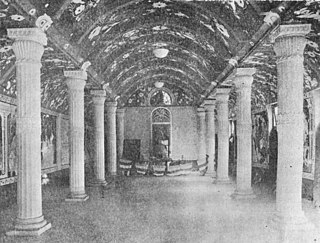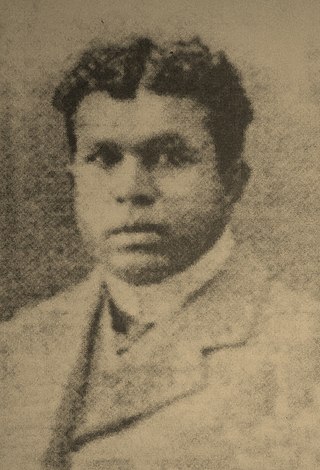
Anagārika Dharmapāla was a Sri Lankan Buddhist revivalist and a writer.

The Maha Bodhi Society is a South Asian Buddhist society presently based in Kolkata, India. Founded by the Sri Lankan Buddhist leader Anagarika Dharmapala and the British journalist and poet Sir Edwin Arnold, its first office was in Bodh Gaya. The organization's efforts began in order to resuscitate Buddhism in India, and to restore the ancient Buddhist shrines at Bodh Gaya, Sarnath and Kushinara. The restoration and revival of the glory and sanctity of Bodh Gaya are also aims of Maha Bodhi Society.

The Buddhist flag is a flag designed in the late 19th century as a universal symbol of Buddhism. It is used by Buddhists throughout the world.

The Sri Lankan independence movement was a peaceful political movement which was aimed at achieving independence and self-rule for the country of Sri Lanka, then British Ceylon, from the British Empire. The switch of powers was generally known as peaceful transfer of power from the British administration to Ceylon representatives, a phrase that implies considerable continuity with a colonial era that lasted 400 years. It was initiated around the turn of the 20th century and led mostly by the educated middle class. It succeeded when, on 4 February 1948, Ceylon was granted independence as the Dominion of Ceylon. Dominion status within the British Commonwealth was retained for the next 24 years until 22 May 1972 when it became a republic and was renamed the Republic of Sri Lanka.
Sir Herbert Layard Dowbiggin was the eighth British colonial Inspector General of Police of Ceylon from 1913 to 1937, the longest tenure of office of an Inspector General of Police (IGP). He was called the 'Father of Colonial Police'. He was knighted in 1931.
Gunadasa Amarasekera is a prominent Sinhala writer, poet, and essayist from Sri Lanka.

Theosophical teachings have borrowed some concepts and terms from Buddhism. Some theosophists like Helena Blavatsky, Helena Roerich and Henry Steel Olcott also became Buddhists. Henry Steel Olcott helped shape the design of the Buddhist flag. Tibetan Buddhism was popularised in the West at first mainly by Theosophists including Evans-Wentz and Alexandra David-Neel.

Patrick de Silva Kularatne was a Sri Lankan educationist and politician. He was a Member of the State Council of Ceylon (1942-1947) and Member of Parliament (1960-1965). He served as Principal of Ananda College and Dharmaraja College and established Nalanda College Colombo, Ananda Balika Vidyalaya, Moratuwa Vidyalaya and Dharmapala Vidyalaya. As a member of the executive committee on Education, he played an instrumental role in the realisation of free education from kindergarten to university.

Don Carolis Hewavitharane Wijeyaguneratne (Sinhala: දොන් කරෝලිස් හේවාවිතාරණ)(1833 – 18 February 1906) was a Ceylonese businessman, industrialist, philanthropist and a pioneer of the Buddhist revival movement. He was the father of Anagarika Dharmapala, and founded a family of considerable influence.

Gunapala Piyasena Malalasekera, OBE, JP, was a Sri Lankan academic, scholar and diplomat best known for his Malalasekara English-Sinhala Dictionary. He was Ceylon's first Ambassador to the Soviet Union, Ceylon's High Commissioner to Canada, the United Kingdom and Ceylon's Permanent Representative to the United Nations in New York. He was the Professor Emeritus in Pali and Dean of the Faculty of Oriental Studies.

Sir Nicholas Attygalle was a Ceylonese academic, surgeon and a Senator. He was the President of the Senate of Ceylon from 1953 to 1960 and the first Ceylonese Vice-Chancellor of the University of Ceylon, where he was known as the "Iron Vice Chancellor".

Sri Lanka has a free and universal health care system. It scores higher than the regional average in healthcare having a high Life expectancy and a lower maternal and infant death rate than its neighbors. It is known for having one of the world's earliest known healthcare systems and has its own indigenous medicine system.

Mangala Nath Moonesinghe was a Sri Lankan lawyer and politician. He served as a Member of Parliament for Bulathsinhala electorate between 1965 and 1977, and the Kalutara electorate between 1989 and 1994. He was Sri Lankan High Commissioner to the United Kingdom from 2000 to 2002 and Sri Lankan High Commissioner to India from 1995 to 2000.
The University of Peradeniya, in Sri Lanka, is composed of nine undergraduate faculties of study. These faculties contain 79 departments in total. In addition, the university has two postgraduate institutions and six affiliated centres.

Edmund Hewavitarne was a Ceylonese businessman and reservist. A member of Ceylon Defence Force, he was court-martialed for treason and died in prison, he was given posthumous pardon. He was the younger brother of Anagarika Dharmapala.
Karuna Nayaka Ovitigalage Dharmadasa is one of the pioneers of linguistics in Sri Lanka and scholar of international repute. He is Professor Emeritus, and the former Dean of the Faculty of Arts at the University of Peradeniya, Sri Lanka.
The 1915 Sinhalese-Muslim riots was a widespread and prolonged ethnic riot in the island of Ceylon between Sinhalese Buddhists and the Ceylon Moors. The riots were eventually suppressed by the British colonial authorities.
Charles Dahanayake was a Sri Lankan born academic who was the Founder Professor of Physics and former Dean of Faculty of Science, University of Kelaniya. The author and translator of many Sinhalese Physics books, he was the founding president of the Institute of Physics, Sri Lanka (IPSL).

Piyadasa Sirisena was a Ceylonese pioneer novelist, patriot, journalist, temperance worker and independence activist. He was the author of some of the bestselling Sinhalese novels in early 20th century. A follower of Anagarika Dharmapala, Siresena was the most popular novelist of the era and most of his novels were on nationalistic and patriotic themes. Piyadasa Sirisena used the novel as a medium through which to reform society and became one of the leaders in mass communication in the early part of the 20th century. Piyadasa Sirisena is widely considered as the father of Sinhalese novel. Some of his novel were reprinted even in the 21st century.













